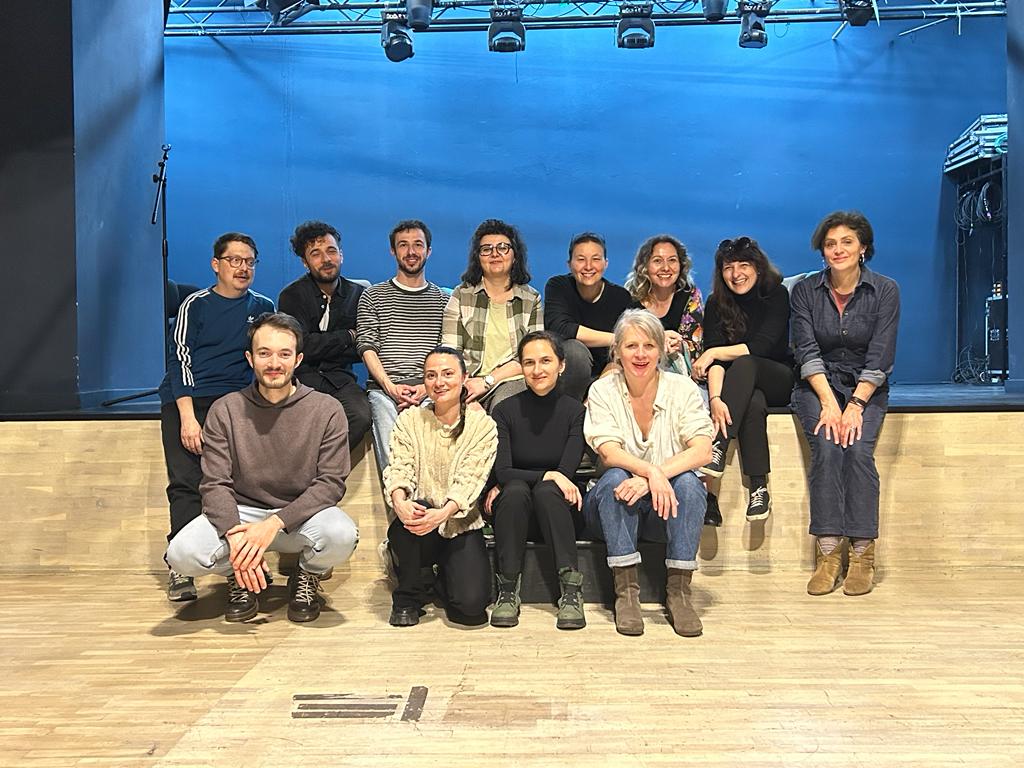de Dan Iliuță – Student în cadrul Programului pentru Producători al CNDB (Centrul Naţional al Dansului Bucureşti), aflat în practică la Teatrelli
For English please scroll down
Dintr-odată, în timp ce fiecare își ascundea propriile gânduri prin diferite colțuri, un zgomot strident umplu camera, urmat de o icnire. Greu de rememorat a cui (și lipsit de importanță), după cum deja păreau să ni se disipeze identitățile. Știu doar că-n următoarele clipe, zeci de cioburi minuscule se răspândeau pe podeaua sălii, iar câțiva dintre noi ne repezeam deja înspre ele, angrenându-ni-se simbiotic corpurile, aproape instinctiv, ca printr-un semnal al dezmorțirii mult-așteptate.
Poate că acest moment cu rezonanță (deși ușor de ignorat) a devenit simbolic pentru atelierul susținut de Johanna Freiburg și Ilia Papatheodorou, membre ale colectivului feminist de performance She She Pop, în orele de spargere — și recompunere — a „adevărurilor” identitare, colective și personale deopotrivă. Mai exact, relevarea (și niciodată divulgarea până la nonsens) unor drumuri posibile în instrumentarea materialului autobiografic pe scenă, prin câteva exerciții de grup, ce ne-au dus cu privirea cu mult dincolo de ceea ce proiectăm.
Numele, vârsta, locul de origine. Ieșirea din rând, rostirea fragmentară a acestor date în fața celorlalți, dar și greutatea secundelor dinaintea fiecărui prim pas. Emoțiile improbabile.
Unii dintre noi au o relație complicată cu părinții.
Unii dintre noi vor să-și cunoască mai bine istoria.
Unii dintre noi… (nu) se regăsesc.
Cine sunteți? Ce dețineți?
Cine suntem?
Ce vrem?
Cine sunt?
Alternarea rolurilor de chestionat/intervievator, coagularea narațiunilor personale, în numele solidarității, dincolo de limita distingerii indivdiualităților, ori cartografierea ambivalențelor din tot ceea ce ne compune, le-a permis participanților (membri ai echipei proiectului „Lasă-i să moară proști”, în regia Catincăi Drăgănescu), să regăsească, totodată, o dimensiune dramaturgică recurentă, ce se cere sondată și pe viitor: sincopele de sens, cât și, prin reflex, liniștea cântăririi răspunsurilor, mai ales atunci când vorbim și în numele celui-/celeilalte, construindu-ne istoria comună, frază cu frază, mereu cu un pas înaintea lucidității.
Ce rămâne este o invitație la noi dialoguri performative, prin care întrebări de acest gen, recontextualizate, pot ajunge să scoată la lumină diferențe semnificative între membrii unui colectiv aparent omogen, dar și implicațiile lor societale mai largi. Mărturie stau, în acest sens, tematicile explorate de grupul german, prin performance-urile sale provocatoare.
Fiind parte din noua etapă a spectacolului-laborator ce interoghează paradoxurile definitorii, în acest caz, ale unei întregi generații — una a cercetării de noi metode ce-i poate informa direcția scenică —, au luat parte la acest atelier: Catinca Drăgănescu (coordonatoare și regizoare), Mara Căruțașu, George Albert Costea, Vladimir Purdel (performeri), Andrei Raicu, Bogdana Dima (live music performance) și Gabi Albu (scenograf).
///
All of a sudden, while each of us was hiding his thoughts in various corners, a shrill noise — followed by a gasp — filled the room. Hard to remember whose (and wholly unimportant), as our identities already seemed to dissipate. The next thing I recall is that, for the next few seconds, dozens of tiny shards were spreading across the hall’s floor, and several of us were already rushing towards them, with our bodies engaged symbiotically, almost instinctively, as if by a long-awaited call of animation.
Perhaps this resonant (and seemingly insignificant) moment remained telling for the process of the workshop held by Johanna Freiburg and Ilia Papatheodorou, members of the feminist performance collective She She Pop, in its hours of breaking — and recomposing — identity “truths,” collective and personal. More precisely, revealing (and never divulging to the point of the absurd) some possible pathways in instrumenting autobiographical material on stage, by way of some group exercises that took us far beyond what we project outwards.
Name, age, birthplace. Moving out of line, the fragmentary utterance of these pieces of the self in front of others, but also the weight of the seconds before each first step. The improbable butterflies.
Some of us have a complicated relationship with our parents.
Some of us want to understand our history better.
Some of us… (don’t) find a sense of belonging.
Who are you? What do you own?
Who we are?
What do we want?
Who am I?
Alternating the roles of respondent/interviewer, the mingling of personal narratives (in the name of solidarity) beyond the individualities’ contours, or mapping the ambivalences of everything making us up, together allowed the participants (the team of Catinca Dragănescu’s “Let Them Die Stupid” work-in-progress show) to find a recurring dramaturgical dimension simultaneously, one which awaits further probing: the breaks of meaning, as well as the conducive silence of weighing the answers, especially when we also speak on behalf of the other, building our shared history, phrase by phrase, always one step ahead of lucidity.
What remains is an invitation to new performative dialogues, through which questions of this kind — recontextualized further — can shed light on significant differences between members of an apparently homogeneous collective, as well as their wider societal implications. In this sense, the themes explored by the German group, through its provocative performances, stand as testimonies.
The workshop being part of the new chapter — one of researching new methods that can inform its stage direction — of the above-mentioned laboratory/performance, which interrogates the defining paradoxes of an entire generation, its following members took part in it: Catinca Drăgănescu (coordinator and director), Mara Căruțașu, George Albert Costea, Vladimir Purdel (performers), Andrei Raicu, Bogdana Dima (live music performers) and Gabi Albu (set designer).

